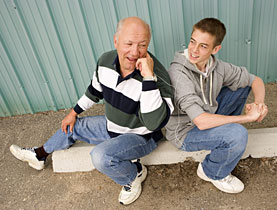Abuse of elderly in care is “isolated case”

Humiliated and filmed naked – the treatment of vulnerable elderly residents in a Zurich nursing home has raised serious concerns about abuse in residential care.
Five care workers, including a nurse, are under investigation for involvement in abusive filming, assault and theft at the Entlisberg nursing home.
The scandal has played out the worst fears of elderly people and their families about the quality of care given to the most vulnerable in society, particularly dementia patients.
More than 100,000 staff look after some 85,000 elderly people in residential care in Switzerland. The organisation that represents the country’s care institutions has emphasised that this shocking case is an isolated one which does not reflect the good standard of care delivered by its members.
Most of the country’s 1,500 nursing homes and institutions are members of Curaviva, which said it learnt of the Entlisberg story with “disgust and concern”.
Violation
“Cases like the one in Entlisberg nursing home damage the whole sector and must be punished immediately and without compromise,” Markus Leser of Curaviva said.
“In 25 years working in the sector, I have never come across such an extreme case. That is a case that violates the dignity of the person, filming someone naked on the floor. And I hope it remains a unique case,” Leser added.
Despite the rarity of such serious abuse, Curaviva intends to put more emphasis on violence and abuse in its training programmes.
The organisation also provides its members with good practice rules and health and safety recommendations, which will now include a ban on mobile phones.
“There is no reason why care personnel should have phones on them while carrying out their duties,” Leser said.
Inspections
Regulation of nursing homes is overseen by the health authorities of each canton with inspections taking place on a regular basis.
The Entlisberg home was inspected twice at the end of last year, both times on scheduled visits, but nothing untoward was found.
In canton Vaud in western Switzerland inspectors on unannounced visits discovered residents locked in their rooms or tied to their beds in 17 out of 50 homes.
However, Leser explained the delicate balance caregivers have to strike between free will or freedom of movement and safety.
“Ideally one should be able to decide everything for oneself until the day one dies, but that is not always easy. Take a concrete example: if you have someone who does not want to take a shower but is dirty,” he said.
“It can happen that the team has to decide to wash the person without their consent. Then the question arises, is it violence if we take the person forcibly to the shower, or should we leave him lying in his urine? What happens when the family complains that their father has not been washed?”
Patients with dementia who are unable to communicate, such as those abused in the Zurich home, are at once the most demanding and the most vulnerable.
“It is certainly the most challenging care situation,” Leser said.
Staff shortage?
Although a staff shortage is looming, employers can still find suitable staff and Leser denies reports that they are being forced to hire unfit personnel.
“In any case, people will be let go if it turns out they have the wrong character or lack of aptitude for this demanding job,” he said.
With an ageing population, the demand for beds and care personnel is set to rise sharply. According to the Federal Statistics Office, the population aged 65 and over will grow by 400,000 by 2020, an increase of 34 per cent.
A recent study by the Swiss Health Observatory forecast that 15,000 more staff would have to be recruited in the sector in the next ten years.
“We will have to think very carefully about how we react to this skills shortage,” Leser said.
The authors of the study suggested several ways of tackling the expected shortfall – among them better health promotion for the elderly, rethinking the delivery of care, increasing the number of training places and making the work more attractive.
Old peoples’ and nursing homes: 1,544
Beds (including short stay): 88,183
Personnel: 101, 987
Equivalent in full-time positions: 70,488
Two-thirds of personnel involved in care
Staff: 85 % female
Source: Curaviva 2008
Zurich police announced on February 23 that following a complaint they had opened an investigation into five employees of the Entlisberg nursing home in the city.
The care workers had allegedly filmed elderly residents naked, mistreated them and stolen from them.
Three of the five were immediately dismissed from their jobs.
Police found mobile phone footage of at least two elderly women filmed naked while being mocked, one lying on the floor of her room, the other in the shower.

In compliance with the JTI standards
More: SWI swissinfo.ch certified by the Journalism Trust Initiative












You can find an overview of ongoing debates with our journalists here . Please join us!
If you want to start a conversation about a topic raised in this article or want to report factual errors, email us at english@swissinfo.ch.